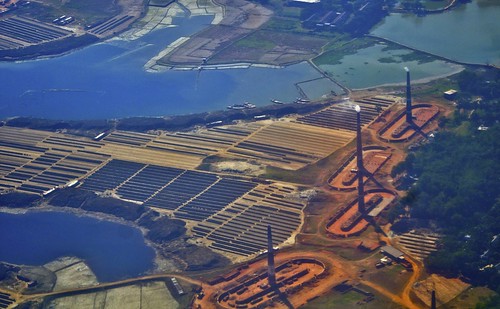摘譯自2013年2月5日ENS泰國,曼谷報導;藍巧軒編譯;蔡麗伶審校
亞洲19個國家的政府代表4日召開環境會議,商討如何減緩亞太地區短週期氣候污染物的影響。會中,各國政府討論到該如何減少黑碳、甲烷、對流層中的臭氧等物質;另外,針對一些用來取代危害更大的物質,包括氫氟碳化物、冷媒等,也在討論之列。這些污染物質是造成氣候變遷的主要原因之一,同時它們也會對人類的健康、農業、生態系統造成相當不利的影響。

這場會議由聯合國環境規劃署(UNEP)孟加拉及日本政府共同主辦,「氣候與清淨空氣聯盟」(Climate and Clean Air Coalition,CCAC)贊助。
這是第一次,短期氣候污染物的議程搬上地區級會議談判桌上來討論。
CCAC成立至今已一週年,這是一個全球自主性團體,由28個會員國、跨政府組織、社會公民代表和其他致力於減少這些空污物質的私人機構共同組成。
UNEP執行長史坦納(Achim Steiner)表示,「我們歡迎所有亞洲和太平洋地區的國家都來加入氣候與清淨空氣聯盟,各國的加入可以擴大我們的工作範圍,也能夠組成更大的力量與其它的會員國共同來面對短週期溫室氣體所帶來的挑戰,並提供快速且多樣的公共健康、食物、能源安全等短期氣候效益。」
在會議中,個參與國家會針對現有的措施做討論,以能夠快速的整合成經濟發展與環境保護政策為主要考量。
孟加拉環境與森林部部長Dr. Hasan Mahmud指出,「孟加拉近年來正致力於磚窯的現代化、改善數百萬的鍋爐、增進稻米乾燥系統、建立空氣品質偵測器與採納相關的環境研究報告。」
日本日本環境省地球環境審議官谷津龍太郎(Ryutaro Yatsu)也說道,「日本會全力支持CCAC,並將行動焦點放在短期氣候污染,貢獻我們在政策制定及研究方面的知識與經驗,與其他會員國和組織展開密切的合作。我們樂於支持CCAC擴展至亞太地區,其擴展是推行這些地區永續發展相當有意義的指標。」
1月25日,10多名來自CCAC會員國的部長才共同宣布,他們將會和全球的石油與天然氣公司合作,希望在石油和天然氣生產過程中,可以減少排放、洩漏和燃燒掉的天然氣。
據CCAC估算,每年全球有超過8%的天然氣在排氣、洩漏和燃燒的狀況下散失。除了在能源與經濟上270至630億美元的損失,這些活動造成每年約20億噸的溫室氣體排放量,其中超過80%是甲烷,這使得石油及天然氣作業成為僅次於農業的全球第二大人為甲烷排放源。
此外,燃燒作用釋放大量的黑碳,則會對人類健康及北極地區產生嚴重傷害。
對CCAC提案有興趣的石油和天然氣公司已經開始合作,並會在接下來數個月加速行動。
根據UNEP在2011年發表的研究指出,減少短週期氣候污染物質排放,到2030年可以避免約200萬人早死、並減少每年超過3000萬噸的農作物損失。
UNEP的報告中也指出,減少這些物質,有助於在2050年前減緩氣候變遷,同時也可以提高地區性的氣候效益。
UNEP的研究發現,亞洲地區是減少氣候污染物質受益最多的地區之一,其中針對交通部分的減少黑碳措施可以增進空氣品質,而減少煤礦的甲烷排放則對農作物有益。
UNEP說,減少短期氣候污染物質排放可以減緩喜馬拉雅山上冰河融化,也可以減緩南亞季風的消減。
這次會議是第四次亞洲政府城市空氣品質會議的一部份,該會議每兩年舉行一次、由UNEP和CCAC主辦,目的在報告各國政府在城市空氣品質管理的發展,以及整合亞洲各國共同改善城市空氣品質。
Asian Countries to Reduce Short-lived Climate Pollutants
BANGKOK, Thailand, February 5, 2013 (ENS)
Officials from 19 Asian countries are cooperating to reduce the impact of short-lived climate pollutants in the Asia-Pacific region.
At a United Nations-backed meeting Monday, the officials began discussions on how best to reduce these air pollutants, which include black carbon, methane and tropospheric ozone as well as some hydrofluorocarbons, refrigerants that replaced even more damaging chemicals.
These pollutants are responsible for a substantial portion of climate change and have detrimental effects on human health, agriculture and ecosystems.
The meeting, which is hosted by the UN Environment Programme, and the governments of Bangladesh and Japan, is being held under the auspices of the Climate and Clean Air Coalition.
This is the first time that the challenge of short-lived climate pollutants has been tackled collectively at an Asia-wide meeting.
The one-year-old Climate and Clean Air Coalition is a voluntary global effort bringing together 28 partner countries, intergovernmental organizations and representatives of the civil society and the private sector who are working to reduce these pollutants.
"We look forward to welcoming all countries in Asia and the Pacific into the Climate and Clean Air Coalition to scale up the work and join forces with the other partners in this effort to address the challenge of short-lived climate pollutants and deliver rapid and multiple public health, food and energy security, as well as near-term climate benefits," said UNEP Executive Director Achim Steiner.
During the meeting, participants will discuss existing measures that can be quickly taken up and integrated into strategies for economic development and environment protection.
Bangladesh's Minister for the Environment and Forests Dr. Hasan Mahmud said, "Bangladesh has been working for the last few years towards modernization of brick kilns, improvement of millions of cook-stoves, improvement of rice parboiling systems, setting up of air quality monitoring mechanisms and adoption of relevant enabling environmental documents."
The Japanese Vice-Minister for Global Environmental Affairs Dr. Ryutaro Yatsu added, "Japan is engaged to support CCAC and will contribute to the actions focused on short-lived climate pollutants, cooperating closely with partner countries and organizations, with our knowledge and experiences both in policy making and research.
"We are pleased to support the expansion of the Coalition to Asia and the Pacific because it is really meaningful in light of the promotion of sustainable development in the region," Yatsu said.
On January 25, more than a dozen ministers from Climate and Clean Air Coalition partner countries jointly announced they will work with oil and gas companies worldwide to reduce venting, leakage, and flaring of natural gas from oil and gas operations.
Gas flaring from a refinery at Lanzhou, Gansu, China (Photo by Adam Cohn)
The coalition estimates that over eight percent of total worldwide natural gas production is lost annually to venting, leakage, and flaring.
In addition to U.S. $27 to $63 billion in energy and economic losses, these activities result in nearly two gigatons of CO2 equivalent of greenhouse gas emissions per year, over 80 percent of which are methane emissions – making oil and gas operations the second-largest source of global anthropogenic methane emissions behind agriculture.
Flaring releases substantial amounts of black carbon, which is particularly harmful to human health and areas like the Arctic.
Initial CCAC engagement with interested oil and gas companies is beginning and will accelerate over the coming months.
Reducing short-lived climate pollutants by 2030 could avoid two million premature deaths and annual crop losses of over 30 million tons each year, according to a study released in 2011 by the UN Environment Programme, UNEP.
The reduction of these pollutants would also help to slow down climate change by 2050 and deliver climate benefits at a regional level, the UNEP study shows.
The UNEP study found that Asia is one of the regions that could benefit the most from such reductions, as black carbon measures targeting the transport sector would improve air quality, and reducing methane emissions from coal mines would benefit crops.
Reducing levels of these short-lived climate pollutants would slow the melting of glaciers in the Himalayas and reduce disruption of the South Asian monsoon, UNEP said.
The meeting is part of the Fourth Governmental Meeting on Urban Air Quality in Asia, held every two years and organized by UNEP and Clean Air Asia to inform governments on developments in urban air quality management and to harmonize approaches among Asian countries in tackling urban air pollution.
※ 全文及圖片詳見:ENS
文章@台灣環境資訊中心



